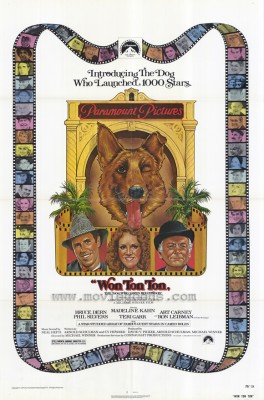| Reviews & Columns |
|
Reviews DVD TV on DVD Blu-ray 4K UHD International DVDs In Theaters Reviews by Studio Video Games Features Collector Series DVDs Easter Egg Database Interviews DVD Talk Radio Feature Articles Columns Anime Talk DVD Savant Horror DVDs The M.O.D. Squad Art House HD Talk Silent DVD
|
DVD Talk Forum |
|
|
| Resources |
|
DVD Price Search Customer Service #'s RCE Info Links |
|
Columns
|
|
|
Won Ton Ton, the Dog Who Saved Hollywood
Yet another Paramount title sublicensed to Legend Films, the transfer is 16:9 enhanced but unimpressive. The cover art is highly misleading, suggesting a family-friendly film like Disney's Air Bud movies; unsuspecting parents may be taken aback by scenes involving prostitution, stag films, transvestism, and canine suicide.
The set-up ain't bad. At Grauman's Chinese Theater (on the marquee: Rooster Cogburn), curious tourists ask about long-forgotten Won Ton Ton, whose paw prints decorate the theater's forecourt alongside other great stars. Flashback to the days of silent cinema, where Estie Del Ruth (Madeline Kahn) is a typically struggling aspiring actress rooming with Fluffy Peters (Teri Garr). Grayson Potchuck (Bruce Dern), loosely based on Darryl Zanuck, is a bus driver/Hollywood tour guide also trying to break into the business.
Potchuck is forever bringing scripts to J.J. Fromberg (Art Carney), the head of dilapidated New Era Studios, but J.J. isn't buying Potchuck's crazy ideas: "It's about a giant shark terrorizing an entire New England town!" Potchuck enthuses. J.J. is unimpressed: "That's the worst idea I've ever heard in my entire life!" More generally unfunny references to '70s blockbusters follow.
Meanwhile, a highly intelligent German Shepherd (amusingly billed as Augustus Von Schulmacher in the credits, but actually played by several different dogs) escapes from the dog pound and takes a liking to Estie. After wreaking havoc at New Era Studios, Potchuck and J.J. get the idea to star the pooch in a series of movies. Potchuck claims the dog is his, but learns he needs Estie's help; she's the only one the newly-christened Won Ton Ton will listen to. There's also an embarrassing subplot about a conceited Rudolph Valentino type (Ron Leibman, admirably game given the circumstances) admired by the ladies but secretly a gay transvestite.
When Won Ton Ton was being produced, nostalgia for old movies was at its zenith, even reaching a mild mainstream popularity they no longer enjoy. That's Entertainment! (1974), MGM's compilation film of movie musical highlights, was a surprise hit at the box office, an elderly Groucho Marx was appearing on talk shows and at Carnegie Hall to the delight of mostly college-age audiences, dead stars like W.C. Fields, James Dean, and Humphrey Bogart were enjoying cult followings on late-night TV and in revival houses, a popularity also reflected in new movies like W.C. Fields & Me, September 30, 1955, and Play it Again, Sam. And Mel Brooks found his niche parodying classic movie genres, including old Westerns (Blazing Saddles) and Universal horror movies (Young Frankenstein).
In this environment, Won Ton Ton, the Dog Who Saved Hollywood probably seemed sure-fire; Bruce Dern recalls in his memoirs that initially he found the script hilariously funny. Unfortunately, what's onscreen is disastrously bad. One problem is the movie has no idea what it wants to be: a satire of modern Hollywood within a silent era setting; a parody of silent filmmaking; a Disney-type family film about a dog; a slapstick comedy along the lines of Mack Sennett's Keystone Cops; a racy Mel Brooks-type spoof with off-color jokes and lots of sexual innuendo. These myriad elements just don't come together and the film plays very schizophrenic.
What's more, of all the directors in Hollywood, the producers picked the one probably least-suited for the job: Michael Winner, fresh off the controversial thriller Death Wish, and who remains best-remembered for his long association with tough guy Charles Bronson. In that genre Winner was quite adept (The Mechanic, Chato's Land, and Death Wish are underrated, unjustly-maligned films) and in fairness Winner did direct a few comedies in his native England prior to hooking up with Bronson.
But on Won Ton Ton Winner's whole approach is dead wrong. In trying to sell the material he and cutter Bernard Gribble opt for a relentless pace; shots tend to be extremely short throughout the picture - it's cut less like a silent comedy than like Star Wars. Winner also relies much too heavily on close-ups and roving zooms; these tend to ruin the gags because the audience can't clearly see what's going on. Winner and Gribble even cut away in the middle of sight gags, just as the joke is about to pay off.
The film has lots of weird in-jokes and flashes of tastelessness, nothing as bad as Myra Breckenridge but not far removed: outside Estie and Fluffy's apartment, a little girl lies nude on the front lawn prompting the landlady (Joan Blondell) to say, "Get your clothes on, Norma Jean!" When Won Ton Ton becomes distraught late in the film, he attempts suicide by sticking his head in a gas oven and throwing himself in front of a speeding truck. In a truly strange scene that must have traumatized small children in the audience, the well-trained animal then sticks his head in a hangman's noose, kicking away the chair below him. (Even old Augustus Von Schulmacher, trouper though he is, seems spooked by this little stunt.) I doubt the SPCA would allow stuff like that today.
More bizarrely, when Estie, Fluffy, and Potchuck fall on hard times the girls are reduced to prostituting themselves while like Ed Wood Potchuck clings onto a career by shooting striptease loops for bored Mexicans.
Complaints aside, I did actually laugh a couple of times. Carney has a funny drunk scene, for instance, and Dern and Kahn rise above the material giving agreeable, enthusiastic performances.
Eschewing the usual "Ta-DA!" style of most cameos, dozens upon dozens of familiar faces fly by like meteorites. Forget blink and you'll miss 'em: if you're looking at the wrong side of the frame you'll likely miss a star or two. (Somehow I missed Ricardo Montalban and Guy Madison.) However, trying to spot the gaggle of once-famous names and checking out how they looked in 1975 offers considerable enjoyment.
Among the more surprising faces turning up: Richard Arlen, Rory Calhoun (in a William S. Hart-type part), William Demarest (his last film), Andy Devine, Alice Faye, Stepin Fetchit (his last), Huntz Hall, Dick Haymes (his last), Victor Mature (in one of the few funny cameos), Virginia Mayo, Ethel Merman, Dennis Morgan (his last), Barbara Nichols (her last), two of the Ritz Brothers (their last), Rudy Vallee (his last), and Eddie Le Veque, last surviving member of the Keystone Cops. Phil Silvers gets fourth billing but looks sickly and has about four lines as Carney's brother. Weissmuller has one line: "You're wanted on the phone." Broderick Crawford, as a special effects guy, has maybe three. Dennis Day plays a singing telegram man; Fritz Feld hangs around long enough to "pop" his mouth several times. Morey Amsterdam throws a custard pie, Stepin Fetchit, playing a butler, dances furiously in the background. Walter Pidgeon, playing another butler, throws a rock at Won Ton Ton. And on and on. Many familiar Hollywood locations, including the venerable Bronson Canyon, are utilized.
Did I mention that the film is copyrighted by one Houtsnede Maatschappij?
Video & Audio
Won Ton Ton, the Dog Who Saved Hollywood was shot in 1.85:1 spherical Panavision and presented here at 1.78:1 in enhanced widescreen. Colors are pretty tepid and not very well timed, but otherwise it's a perfectly fine transfer for such a forgotten obscurity. The (English only) mono audio is adequate. There are no alternate audio or subtitle options, and no Extra Features.
Parting Thoughts
This most definitely is not a film for the entire family or audiences generally, but for movie buffs Won Ton Ton, the Dog Who Saved Hollywood is a treasure trove of jaw-dropping material, and for them it's heartily Recommended.
Film historian Stuart Galbraith IV's latest book, The Toho Studios Story, is on sale now.
|
| Popular Reviews |
| Sponsored Links |
|
|
| Sponsored Links |
|
|
| Release List | Reviews | Shop | Newsletter | Forum | DVD Giveaways | Blu-Ray | Advertise |
|
Copyright 2024 DVDTalk.com All Rights Reserved. Legal Info, Privacy Policy, Terms of Use,
Manage Preferences,
Your Privacy Choices | |||||||















